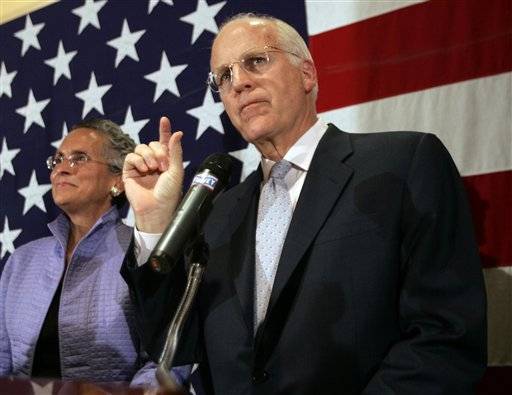GOP a dying breed in New England

Republican Rep. Christopher Shays gives his concession speech as his wife, Betsi, looks on in Norwalk, Conn., Tuesday, Nov. 4, 2008, after he was defeated by Democratic challenger Jim Himes. Before his defeat Tuesday, Shays had been the sole surviving Republican Congressman in all of New England. (AP Photo.Bob Child)
November 10, 2008
HARTFORD, Conn. (AP) — A generation ago the Republican Party was the dominant political force in New England, populating the region’s congressional delegations with moderates like Connecticut’s Lowell P. Weicker Jr. and Rhode Island’s John Chafee.
But today’s GOP, led by a more socially conservative wing of the party, is finding votes harder to come by.
Voters on Tuesday cast out Connecticut’s veteran Rep. Chris Shays, the last New England Republican in the U.S. House of Representatives. Sen. John Sununu was voted out in New Hampshire, leaving that state’s Judd Gregg and Maine’s Susan Collins and Olympia Snowe as the only Republicans among the region’s 12 senators.
Shays’ loss to former Goldman Sachs executive Jim Himes marks the first time since 1969 that southwestern Connecticut will be represented by a Democrat in the House.
“I felt that we were going to win this, I really did,” Shays told supporters. “I felt that people were so good to me, they were so nice to me. But they were deciding they were going to go the other way.”
New England’s decision to “go the other way” in recent elections is a dramatic transformation for a region considered a Republican stronghold a generation ago.
The Republican Party and New England have a long history together.
At their first presidential convention, in 1856, Republicans nominated John C. Fremont on a platform of abolishing slavery in the territories — a widely held view in the North. While Fremont lost, he carried 11 Northern states. Later, Abraham Lincoln captured the presidency by winning 18 Northern states.
By the late 1940s, Republicans held 21 of 28 of New England’s seats in the House of Representatives. But the turning point came in 1964, when the Republicans nominated conservative Barry Goldwater for president, said Gary Rose, a political science professor at Sacred Heart University in Fairfield, Conn.
Known for being fiscally conservative but more socially liberal, Northeast moderates — dubbed the Rockefeller Republicans after the former New York governor — started to be eclipsed by the more socially conservative wing of the party.
“The eastern establishment got weaker and weaker,” Rose said. “Today, there’s really no eastern establishment to speak of.”
Chafee’s son, Lincoln, was appointed to the Senate in 1999 after his father’s death and was elected in 2000 to a six-year term. A moderate like his father, Chafee was the only Republican in the Senate to vote against authorizing the use of force in Iraq. But he was defeated by a Democrat in 2006.
That same year, Reps. Nancy Johnson and Rob Simmons of Connecticut also were defeated by Democrats, buoyed by anti-Iraq-war and anti-President Bush sentiment.
“There is no longer, to speak of, a moderate voice within the party,” Rose said. “It’s a party that’s becoming more narrow and there’s really no sense of compromise within the party.”
Jennifer Donahue, political director of the New Hampshire Institute of Politics at St. Anselm College, said she believes the GOP can still come back, at least in independent-minded New Hampshire where the state motto is “Live Free or Die.”
“It depends on the state. I don’t really think you can look at it as a regional phenomenon,” Donahue said of New England politicians trending Democratic. “The further north you get, the colder it gets, the more the voters look at (races) on a case-by-case basis.”
A large increase of registered Democrats factor into Sununu’s loss, she said. But those numbers can change, especially as more fiscally conservative tax refugees migrate north from neighboring Massachusetts.
“It doesn’t necessarily indicate a long term pattern coming out of this,” she said. “New Hampshire has a uniqueness in that way. It is not fundamentally a state that has in its essence more Democrats than Republicans.”
Lawrence J. Cafero Jr., the Republican leader of Connecticut’s House of Representatives, blames the image of the national Republican party for hurting the GOP in New England, where Republicans historically have often favored fiscal responsibility, abortion rights, protection of personal liberties and strong environmental policies.
He believes the problem worsened with the 1994 so-called “Republican Revolution,” when midterm congressional elections added 54 Republican seats in the House.
“They lost their way and I think more and more New England people, especially those who were Republicans basically because of smaller government and less government intrusion into our lives, started to see their party led by people whose foremost issues were social issues, religious and values and morals, etc.,” Cafero said.
“I think that turned a lot of people off in New England and they didn’t feel the party was really with them,” he added.
Carrie James, a regional press secretary with the Democratic Congressional Campaign Committee, which supports Democratic congressional candidates, said bad feelings about President Bush, the war in Iraq and the weakened economy have helped to persuade New England voters to support Democrats over the past eight years.
One bright spot for the GOP in New England has been their control of governorships. Republicans are governors in Connecticut, Vermont and Rhode Island.
“A big part of our strategy this cycle was to link Republican incumbents with the failed policies of the Bush administration and it’s not applicable in a governor’s race,” James said. “But certainly President Bush damaged the Republican brand across the board.”
Rose said he believes Republican gubernatorial candidates in New England will face the same challenges as GOP congressional candidates. He said it’s difficult to tell what Yankee Republicans represent and what role they’ll play in the future.
“The only reason they’ve been able to survive is they’ve acted like Democrats,” Rose said. “They too, I think are going to become endangered species.”
Thomas Whalen, a political historian at Boston University, said he believes the Republican brand in New England will become even less popular over time, especially as some national party activists tout socially conservative Alaska Gov. Sarah Palin as the future of the GOP and the prime presidential candidate in 2012.
“I think that’s going to turn off even more people (in New England),” said Whalen, author of “A Higher Purpose: Profiles in Presidential Courage.”
Whalen said there is now an opportunity for an independent third party that takes populist stands to develop in New England and envelop moderate Republicans. He said voters in Democratic-heavy states, such as Massachusetts, are going to want a choice at the polls.
“There is no place in the GOP now for the moderates and they need to find a home,” Whalen said. “The brand is dead in New England.”














